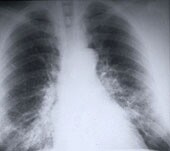- The Best Time of Day to Drink Bone Broth to Maximize Health Benefits
- 8 Ways to Increase Dopamine Naturally
- 7 Best Breads for Maintaining Stable Blood Sugar
- Gelatin vs. Collagen: Which is Best for Skin, Nails, and Joints?
- The Long-Term Effects of Daily Turmeric Supplements on Liver Health
- Could Your Grocery Store Meat Be Causing Recurring UTIs?
- Are You Making This Expensive Thermostat Error This Winter?
- Recognizing the Signs of Hypothyroidism
- 10 Strategies to Overcome Insomnia
- Could Artificial Sweeteners Be Aging the Brain Faster?
Lung Cancer Diagnosis Takes Toll on Patients’ Sex Lives, Experts Say


With between 40 percent and 100 percent of lung cancer patients vulnerable to some form of persistent sexual dysfunction, experts say the issue can no longer be sidelined by physicians.
Experts attending the European Lung Cancer Conference in Geneva this week suggested that the onset of sexual dysfunction is one of the key emotional and physical ramifications of a lung cancer diagnosis.
“It’s time that doctors and scientists paid more attention to this important issue,” Stephane Droupy, of the University Hospital of Nimes, in France, said in a meeting news release.
Droupy said it’s not uncommon for lung cancer patients to experience a notable loss of libido, which sometimes results from the post-diagnosis onset of grief and depression.
Another expert attending the conference agreed that health care workers need to put more focus on patients’ sexual health.
“We know that sexuality is important for quality of life and marital relationships, yet healthcare professionals frequently avoid taking the sexual history of a cancer patient,” said Luca Incrocci, a radiation oncologist and sexologist from Erasmus Medical Center in Rotterdam, Netherlands.
“Of course, this is a difficult subject to deal with for patients and for healthcare providers,” Incrocci said. “But this should not stop us from doing what we can to improve the situation.”
Adding to the problem is the fact that much of the research into sexual dysfunction among cancer patients has focused on the experience of people struggling with breast, prostate or gynecologic cancers. Although those cancers can be serious, the outlook for many lung cancer patients is especially grim, Droupy said.
“Unlike other cancers, where survival is improving, lung cancer management [still] often focuses on short-term quality-of-life improvement and palliative care,” he said. “Sexuality is then even more difficult to protect or reconstruct in a short period of time when all efforts are made to stay alive.”
To tackle the problem, the researchers said, lung cancer patients should seek out doctors who specialize in matters of sexual health early in the cancer treatment process. The goal: to start a frank conversation — often together with their partner — about how their cancer and cancer treatment might impact sexual function.
The researchers stressed that there are meaningful ways to address the situation, which can include both sex therapy and prescription medications.
“Whatever the clinical situation, reconstructing sexual function can significantly improve a cancer patient’s emotional state,” Droupy said. “It is an essential step to revive a sense of personal integrity and masculine or female identity.”
More information
For more on cancer and sexual health, visit the American Cancer Society.
Source: HealthDay
Copyright © 2026 HealthDay. All rights reserved.










